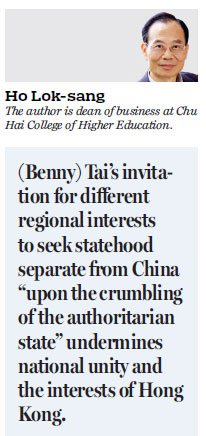Tai's assertions attack Basic Law at its root
Updated: 2018-04-17 06:38
By Ho Lok-sang(HK Edition)
|
|||||||
The Justice Department may seek an injunction to stop Benny Tai from spreading separatist views openly or in class, Ho Lok-sang writes
Some "pan-democrats" took issue with a statement made by the current chief executive in 2016 to the effect that one need not fully agree with every clause in the Basic Law, saying that this contradicts the requirement that officials and legislators are supposed to espouse the Basic Law. In that 2016 statement, Carrie Lam Cheng Yuet-ngor said that she did not agree with Article 107, which says that the government should spend based on its revenue intake. Responding to the query whether she had deviated from espousing the Basic Law, she said that: "There are 160 articles in the Basic Law. Some are statements about basic principles and policy, such as those asserting that Hong Kong is an inalienable part of China; but there are others for which you could have other views"
The chief executive is right. Of course, it is possible that one espouses the Basic Law and yet one may not agree with some clauses in the Basic Law and wish to improve them, so that the interests of Hong Kong and that of the motherland can be better served. The Basic Law has not been formally amended but it has been clarified or interpreted a few times; the national Constitution has been amended a few times. Each time the Basic Law or Constitution is interpreted or changed, it is in order to move forward, to meet the needs of the times, to take advantage of the new knowledge gained, etc. The objective remains the same, however, which is to serve Hong Kong's best interests and to serve the motherland's best interests.

In August 2016, Lam stated that since the government had HK$800 billion of reserves, it could spend as appropriate, implying that the government need not be bound by the literal interpretation of Article 107. As it happens, I myself had taken issue with Article 107, which appeared to imply that the government should take the revenue intake as given, and to spend based on the constraint of the given revenues. This should not be. The revenues of governments are not given. Of course, there is a cost in raising revenue. But if the social benefit of extra spending is bigger than the cost of the additional revenue raised, it does make sense to raise that extra revenue to support that extra spending. This apparent "deviation" from the literal interpretation of Article 107 does not constitute abandoning or opposing the Basic Law.
Civic Party legislator Jeremy Jansen Tam Man-ho challenged the chief executive's "deviation" from the Basic Law, asking whether officials have the right to say things that deviate from the Basic Law without legal consequences, while a man-in-the-street like Benny Tai Yiu-ting is held legally accountable.
Tam has confused the issue. Tai's invitation for different regional interests to seek statehood separate from China "upon the crumbling of the authoritarian state" undermines national unity and the interests of Hong Kong. He is not seeking to improve the Basic Law to make it better serve Hong Kong's and the motherland's interests, and he expressed these views in a forum organized by a group that explicitly challenges the legitimacy of the Communist Party of China's rule. If he cannot see the difference he does not have the intelligence to serve as a legislator.
Under the "one country, two systems" framework, of course Hong Kong people enjoy freedom of speech. But there are limits to freedom of speech. In particular speech that challenges the "one country, two systems" framework will hurt the interests of Hong Kong. Under the "one country, two systems" framework, Hong Kong people should not seek independence from the motherland, nor should Hong Kong people challenge the country's political system. Hong Kong people as Hong Kong citizens can of course criticize policies in Hong Kong and even those on the Chinese mainland, but seeking to replace the national political system with an alternative system or seeking Hong Kong's independence will not serve Hong Kong's best interests, nor those of the country as a whole.
The fact Tai is a professor of law at the University of Hong Kong makes his pro-national-disintegration speech particularly worrying. He wields influence beyond that of most people in Hong Kong and his influence on his students could create more problems down the road. Given that he is a tenured professor of law, it is unlikely that he will be sacked because of his speech. But given the grave consequences of pro-national-disintegration views by a law professor, the Department of Justice may seek an injunction for spreading such views openly or in class. He will say that this constitutes an infringement on freedom of speech but if the court agrees that this has gone beyond the limits of free speech, an injunction would establish clearly that there are limits to free speech. An injunction that comes from an independent court and not from the administration would also command authority and credibility. If he contravenes the injunction order, then action against him by the university can be taken.
(HK Edition 04/17/2018 page11)